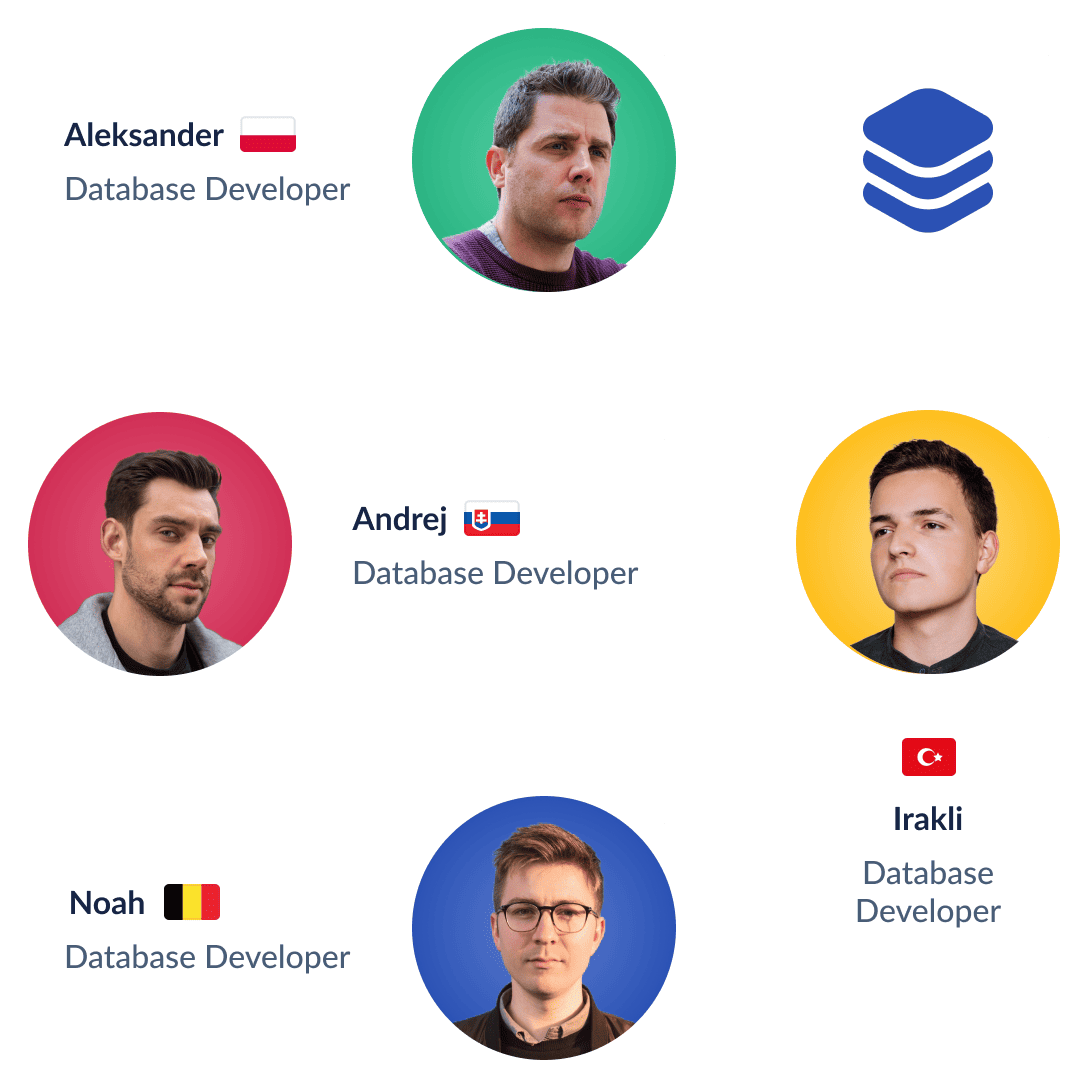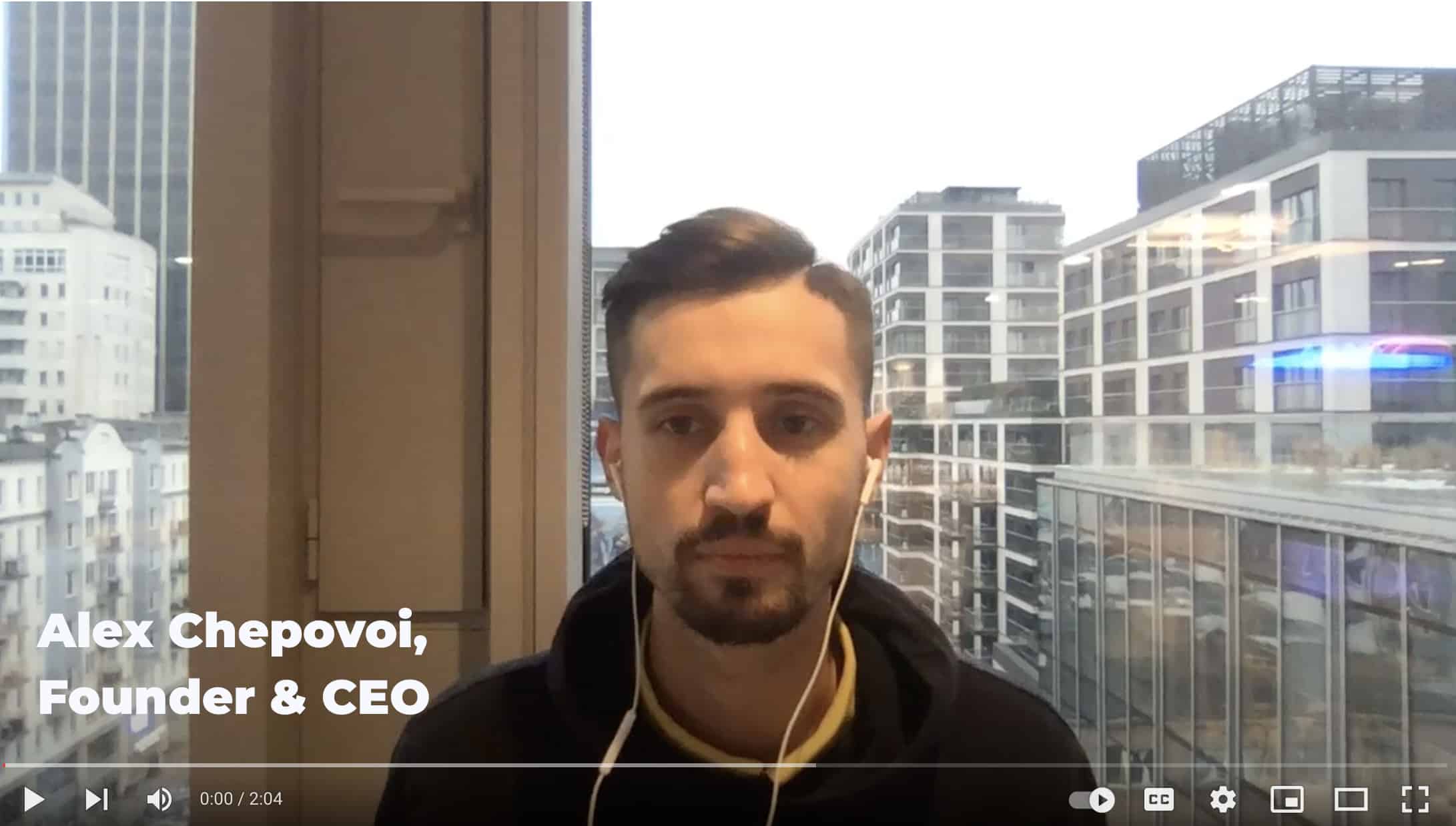Hire Database developers remotely within 3-5 days
You can hire Database developers remotely with Expert Remote. Sign up to access our talent pool. Search available developers, add them to vacancies and schedule interviews.


Hire Top 1% of Database Developers Today
Don’t have the time to search developers yourself?
How we do it
Thousands of developers across the world sign up to our platform each month
They go through our rigorous screening process and only 1% make the cut
We add the best candidates to our talent pool where they wait for projects
You can hire from this pool of world’s best developers on a contract basis, within days
Customer reviews
Frequently Asked Questions
Are you an Agency?
Nope.
Well, some clients call us a virtual agency or an agency 2.0 🙂
1. Typical agencies take 50-70% from a developer salary. We take only 15-30%.
2. Agencies have 10-20 developers on their bench (available). We’ve got 500+ devs.
3. Agencies don’t allow developer buy-out. You can hire our developer in-house after 1 year for “2-month salary” fee.
Will I have a contract with a developer or with Expert Remote?
With Expert Remote.
It’s risky to have 5 contracts with 5 remote developers from 5 different countries.
You’ll have a single B2B contract with our company. So, if smth goes wrong with IP or anything, you can always sue us :)
P.S. Our company is registered in the USA and Poland.
How does the pricing work?
Each developer has their own hourly rate with our commission already included.
We take between 15% and 30% from what you pay, which is 2-3x lower than typical agency fees.
No setup fees. You only pay after you hire a developer.
2-week paid trial. If you don’t like our developer after 2 weeks, we’ll apply a 25% discount on the hours worked.
1-week notice. You can ask for a replacement or cancel the contract within a week.
Which countries are your developers located in?
We source developers across 30+ countries.
Most popular countries: Armenia, Georgia, Poland, Serbia, Albania, Azerbaijan, Turkey, North Macedonia, Romania.
We also got developers in the USA, Canada, UK, Germany, France, Spain, Estonia, Bulgaria, Netherlands, Pakistan, India, Kenya, Nigeria, etc.
What are your average rates?
Rates start from $20/h. The median average is $35-40/h.
There’s always top 10% percentile candidates who are overpriced, and bottom 10% percentile underpriced ;) But most fall into the market rate category.
The beauty of global sourcing is tapping into unknown regions. Have you heard of North Macedonia? You can find senior developers for $25/h (our fee included)!
How do you ensure developer quality?
We source developers with marketing, which is 20-30x more effective than Linkedin. This creates us a huge flood of candidates.
Then we take this top of the funnel and feed it into our proprietary vetting process. Only top 1% of candidates make it through.
Part of the process is automated, which allows us to do it at scale. For instance, our recruiters have their calendars fully booked and able to conduct 200-250 soft-skill interviews a month.
What tech stacks do you have?
We have developers across all major stacks.
Back-end: Node.js, PHP, Python, JAVA, .NET, Ruby, GoLang etc.
Front-end: React, Angular, Vue.js, etc.
Mobile: Swift, Kotlin, React native, Flutter, etc.
AI/ML/Data Science is a big stream for us: machine learning, deep learning, NLP, computer vision, etc. Technologies: TensorFlow, PyTorch, Terraform, Pandas, AzureML, OpenCV, etc.
Can I hire the whole team?
Yes!
Apart from developers we’ve got UI/UX designers, QAs, Product Managers, etc.
Based on your requirements we can assemble the whole engineering team.

13 min read
Freelance Database Developer & Programmer for Hire
A database developer is a broad term that encompasses many different types of professionals. A database specialist is a professional who designs, organizes, sets up, and connects databases to the products they support. The most common database technologies used today are relational database management systems (RDBMS) like Oracle Database and MySQL.
You can hire database developers on a freelance basis for short or long-term projects. Let’s look at the different types of developers, their skills, and ways to hire database developers so that they bring real impact to your project.
Main Skills a Database Programmer Should Have
Freelance database developers and programmers are in high demand. If you’re looking to hire a freelance database developer, you should know what skills they need to possess to be considered professionals.
Relational (SQL) and Non-relational (NoSQL) Databases
These are two types of databases that store information based on different principles but ultimately serve similar purposes. Relational databases store data in tables (rows and columns), whereas non-relational databases do not have any concept of tables or rows. Instead, they collect and organize various types of data in a data structure.
SQL databases work great with static data that does not need to be altered after it is recorded. NoSQL types are better for more dynamic data flow.
The most common RDBMS is MySQL, which powers most enterprise systems including Uber, Airbnb, and Shopify. The most common non-relational database management system (NRDBMS) is MongoDB, which is used by Toyota, Forbes, and Flobiz.
Database Testing
A database developer is often responsible for the quality of the data that is being stored in the database. It means that they need to ensure that their code is working properly and that there aren’t any bugs.
Database programmers should know how to perform ACID properties validation, test data mapping, verify data integrity, and check business rule conformity.
CRUD Operation Knowledge
CRUD stands for Create, Read, Update, and Delete. Essentially, these are the basic visual operations you need to know if you want to work with databases in any capacity. When working with REST APIs, it’s important to understand the CRUD concept because it will help the developer comprehend how the application interacts with other systems.
Data Modeling
A database developer must be able to model data in a way that is logical and practical. It means that they need to understand what the data will be used for and how it will be used. They must also keep in mind how data can be stored and retrieved from the database, as well as how quickly it can be accessed.
Software Architecture
Software architecture defines how the software will be structured, what it will accomplish, and how it will be implemented. Database modules are parts of software architecture and are reflected in a database. Each module represents a separate collection of files or data structures that perform specific functions within the overall system. Database modules can be either physical or logical.
This is critical for database experts because it defines the way that data is stored in the database and what types of queries can be run on that data.
Backend Development Skills
A database developer needs to be able to manipulate the data. This means telling a database what to do with the data so that it can serve as a source of useful information. And though it’s not necessary to know C#, Java, or Python for database application development, even some basics can help enormously. It is especially relevant if the project is centered around handling a large amount of data.
What Freelance Database Developers to Hire for Your Project
Database development jobs are available across various domains such as healthcare and insurance, finance, e-commerce, and the education sector. Database experts can be categorized according to their specialization.
MySQL Developers
Hire database developer who has professional experience working with MySQL databases. They’ll be able to work with any type of SQL-based database system and help design an efficient schema that meets your technical needs.
When to hire MySQL database developers
MySQL is great for building small web solutions, like ecommerce stores for the local market. It is also a great choice for online analytical processing and online transaction solutions. In general, when a comparably small amount of data is used, MySQL will be a great fit.
Oracle Developers
Oracle is another popular database system, and it’s used by many large companies around the world for their mission-critical databases. Oracle developers can help your team design, develop and maintain an enterprise-grade database solution with a high level of availability.
When to hire Oracle developers:
If you have a large database to manage, then Oracle developers are your best choice. Oracle is a reasonable solution for data warehousing and online transaction solutions.
MongoDB Developers
For smaller projects that require less expertise in MySQL or Oracle servers, but still need some complexity in their schemas, consider hiring MongoDB developers. They specialize in NoSQL systems, and their knowledge is more limited than those who’ve worked with more common systems. However, they can provide enough versatility when working with the MongoDB framework.
When to hire MongoDB developers:
Due to its NoSQL nature, MongoDB is best for real-time scalability and data integration. It will be a good fit for product catalogs with multiple attributes, or analytics platforms that continuously track information.
Cassandra Developers
Cassandra database developers are great for business applications that need data to be available and consistent at all times. It’s also very good for workloads that are write-intensive and can handle numerous requests at once. However, if you need transactions in your app (e.g. creating users), Cassandra won’t work well because it doesn’t have ACID compliance like other databases do. The ongoing maintenance cost for a Cassandra database is also very low.
When to hire Cassandra developers:
Cassandra is a popular choice for user activity tracking, where it’s important to keep all data up-to-date as quickly as possible. It will be a good fit for data centers, weather apps, ecommerce stores — where there is a constant flow of information.
Firebase Developers
When you have a new project, and you are not sure which technology to use — hiring a Firebase developer will save you time and money. Firebase is beginner-friendly and easy to use while providing convenient access to data.
When to hire Firebase developers:
Firebase database developers are a common choice for real-time apps that need to be able to handle large amounts of data. Firebase is also easy to set up and can be used in conjunction with other databases like Cassandra. Cloud Firestore can process 1 million concurrent connections making it a good solution for apps with limited sorting and filtering queries.
Top Freelance Database Developer: Skillset by Level
Hiring a freelance database developer can be a daunting task, especially if you’re new to the field. If you’re hoping to hire database developers, here are some of the skillsets database experts should have at different levels.
Junior Database Programmer
Junior database developers are entry-level developers who have just started working with databases. The main skill they should possess is the ability to learn quickly, and if they are passionate enough, then you can expect them to grow fast. They also need to have logical thinking skills and technical skills. These two traits will come in handy while solving complex problems or identifying flaws in existing systems.
Examples of Interview Questions
- What is a relational database?
A: It is a database management system that uses specific schemes like tables to store data.
- What is the difference between SQL and NoSQL?
A: SQL is a relational database system that uses a schema for storing data, while NoSQL is an alternative database model that uses more flexible data structures.
- Can you explain the data model of MongoDB?
A: The data engineering model of MongoDB is an open-source document-oriented database.
Mid-level Database Developer
Mid-level database developers should have a solid understanding of data engineering, database administration, and the ability to create and maintain databases. Mid-level database developers need to be able to demonstrate their knowledge of how each step in the process contributes to creating an accurate model.
Examples of Interview Questions
- What is ACID compliance?
A: ACID compliance is a database property that ensures that a database transaction can’t be lost or corrupted.
- What are some of the challenges of working with big data?
A: Constraints, data volume, and the need for real-time analysis are just a few of the challenges.
- What are some of the benefits of working with big data?
A: It can help you get a better understanding of your customers and provide them with more personalized services.
Senior Database Programmer
A senior database programmer should be able to work on the database from end to end and know how to build, maintain, and support it. The role also requires an understanding of different types of databases, including relational database systems and NoSQL databases. In addition, top developers should be able to write SQL queries that are optimized for performance.
Examples of Interview Questions
- What was your favorite database you’ve worked with, and why?
A: (Possible answer) My favorite database to work with is MySQL. It’s a fast, easy-to-use, and flexible database that I have used for many of my applications.
- What are some of the challenges of using relational databases in an enterprise environment?
A: Relational databases are often difficult to scale.
- What’s a common mistake that developers make when working with databases?
A: The biggest mistake developers make when working with databases is not understanding how to structure the data.
What Other Roles Freelance Database Developers Can Hold
In addition to the roles listed above, there are many other titles that a database programmer can hold.
| Role | Responsibilities | SDK |
| Database Administrator | A database administrator is responsible for maintaining the integrity of your company’s data, making sure it’s backed up properly and ready to be accessed at any time. Database administration includes ensuring that the databases are secure from hackers and performing regular maintenance. | Firebase, Oracle, SQL Server |
| Data Architect | A data architect is responsible for the development and maintenance of an organization’s information management systems. They oversee all aspects of data modeling, web design, and implementation, and ensure that your company’s information system meets your needs. | IBM InfoSphere, MySQL, Oracle |
| Data Engineer | A data engineer is responsible for managing both structured and unstructured data within your organization. It includes everything from maintaining databases to analyzing user behavior on social media platforms like Facebook or Twitter. The purpose is to gain insights into what kind of content you should post next time you’re looking to increase engagement with potential customers in a particular market segment. | MongoDB, MySQL |
| Data Analyst | A data analyst is responsible for analyzing large amounts of data to gain insights into how your company can best improve its operations. This may include using statistical software like SPSS, which can help you understand customer behavior and identify trends in the marketplace that might lead to new opportunities. | Cassandra, MySQL, SPSS |
If you’re looking to hire a freelance database programmer, we hope you found this information helpful. To hire database developers that fit your project, feel free to reach out to us!





